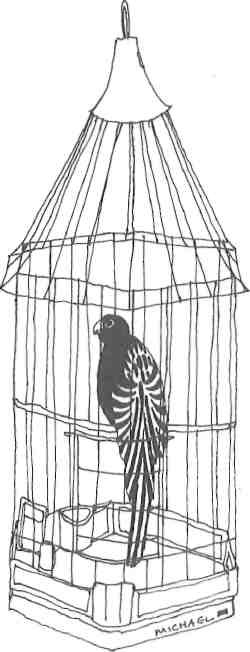
He had come to Greece to investigate reports that an important species of Greek wildlife was being threatened with extinction.
‘The Cretan ibex, or the Macedonian boar?’ I asked him.
‘No, no. It is the Greek journalist.’
‘The Greek journalist?’ I inquired in surprise, ‘an endangered species?’
‘Most definitely,’ Dr. van Tooting nodded.
‘We have received reports that Greek journalists are being set upon at funerals and that one particular chap was beaten up and thrown into a dry lime pit. This will never do.’
‘But, surely, this does not mean the species is threatened with extinction,’ I protested.
‘Oh, yes,’ the doctor affirmed.
‘It is a very vulnerable and a very sensitive species. These recent assaults could well be the thin edge of the wedge.’
‘How so?’ I asked.
‘Well, let me give you an example,’ Dr. van Tooting said.
‘When a foreign dignitary arrives in Athens, the Greek journalist, in the line of duty, will come up to him as soon as he steps off the gangway and keep him cornered with a microphone under his nose and a chill wind from Mount Hymettus blowing down his back. He will then ask him, all in one breath: “How do you like Greece? Where did you come from? When are you leaving? What do you think of the Cyprus question?”
‘So far, the visiting dignitary has managed to restrain himself and mumble something appropriate in reply. But now that he knows Greek journalists can be punched in the nose with impunity, the temptation may be too strong for him to resist.’
Ί see your point,’ I said, ‘but I still don’t think the danger is a mortal one. After all, even before the two incidents you mentioned, reporters have been slugged in riots or had their cameras broken with no lasting ill-effects.’
‘That is true,’ the doctor admitted, ‘but such incidents can be excused as having occurred in the heat of the moment. Deliberate assaults on journalists are another matter. It could send the entire species into a state of shock. They would stop writing, newspapers would not appear and then what would the Greek public do?
‘No more scare headlines with a tiny question mark after them; no more knowing who got run over by whom driving car number so-and-so; no more exposes of recent history based on “secret and authentic” documents; no more gory accounts of crimes of passion perpetrated by a “Stygian assassin” and no way of knowing which chemist is open after hours.’
‘An appalling prospect, Ί admitted. ‘And how do you propose to protect the species?’
‘Well we have many ways of protecting an endangered species,’ the doctor said. ‘First and foremost, a strict law must be passed forbidding anyone from shooting or otherwise harming a Greek journalist in season or out of season. Secondly, the use of pesticides should be forbidden wherever Greek journalists work, live or congregate. Thirdly, large tracts of Government-owned land, by the sea and preferably only a short distance from Athens, should be parceled out among the journalists together with long-term low-interest loans so they can build summer villas where they can relax and spend their summer holiday in comfort. Fourthly, the multi-national companies operating in Greece and elsewhere in Europe should be encouraged to organize more junkets for journalists so such places as Paris, London and New York so they can stock up on perfume, clothes, transistor radios and try their luck at Belmont Park.’
‘That should keep them happy’, I agreed.
‘Certainly,’ Dr. van Tooting said. ‘You must never forget that the Greek journalist, like the whooping crane, the bald eagle, the Japanese crested ibis and many other species on the endangered list, is the end product of millions of years of evolution and must be preserved at all costs. They are part of our ecological heritage which must not be lost. Think what a calamity it would be if the Greek journalist went the way of the dodo!’
‘I’d hate to even consider it,’ I said, with a catch in my voice.







